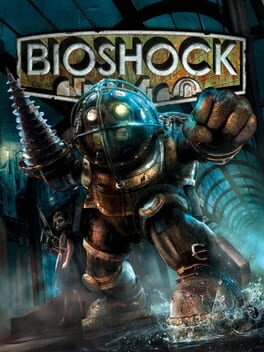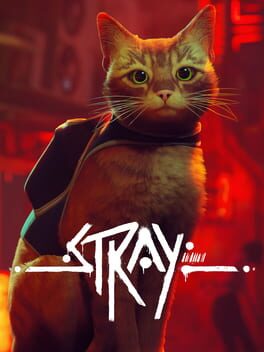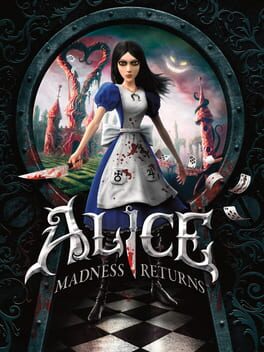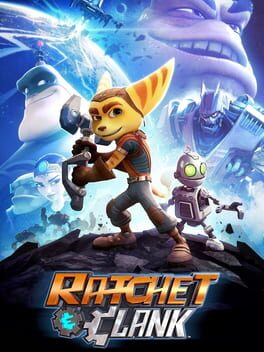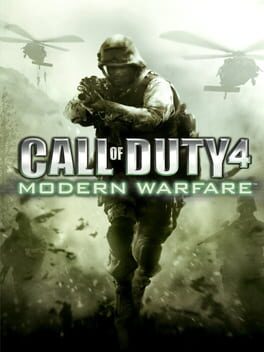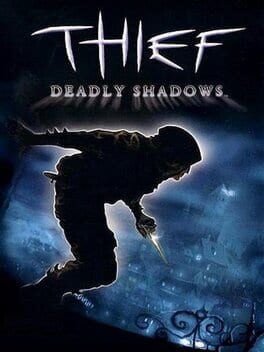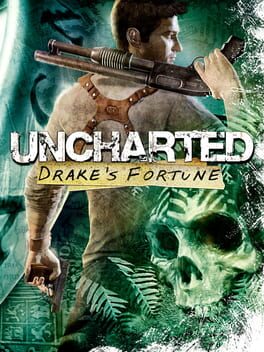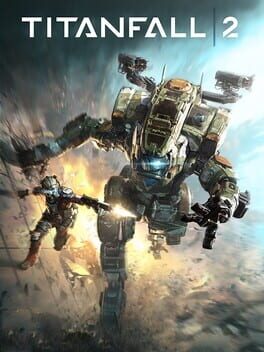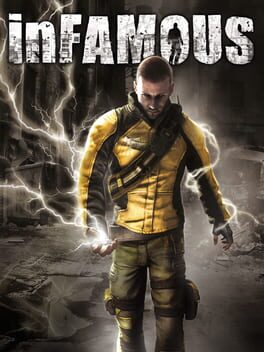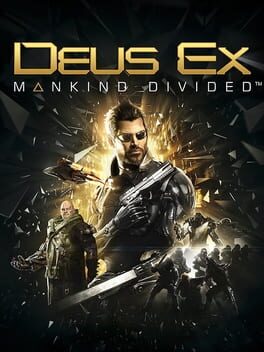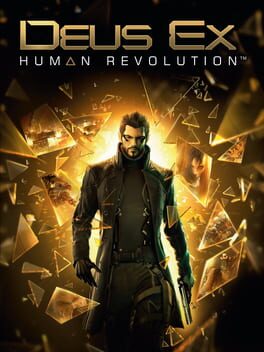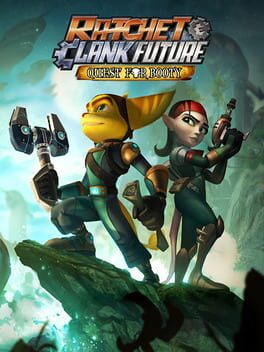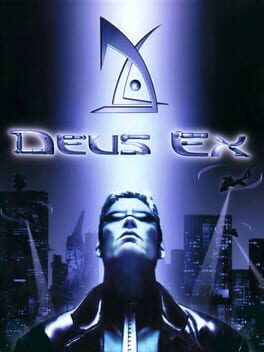blackcat
2007
One of the most brilliant worlds ever created for a game, wasted on some of the most flaccid, lifeless combat I've encountered in a AAA shooter. There are so many genuinely great ideas in this game but the combat lacks any feeling of weight or impact. Guns feel like toys and melee feels like slapping enemies with a pool noodle. Plasmids could have been great but most of them are just things you shoot at enemies so they're hardly different from guns in practice.
It broke my heart a little to be so unenthused by Bioshock when it's one of the most highly acclaimed games ever, and everything outside of the gameplay is so rich and captivating, but when most of the game is shooting everything in your path, the way the guns feel will make or break the game. And Bioshock's shooting is just too limp and dull for me to enjoy. I also found its immersive sim leanings to be massively overstated by players. I will give it credit for having some ways to creatively strategize and interact with the environment, but it felt more like a mildly immersive sim-inspired shooter. It's generally very linear and the only way to progress is by shooting things with guns or shooting things with plasmids.
But I can see how it was an injection of boldness and ambition into the gaming landscape of 2007, so I can appreciate the impact it had at the time. Maybe it's one of those things where I had to be there to understand. That era was also a dearth of immersive sims, which didn't really pick up again until the early 2010s, so Bioshock's ideas were probably quite fresh compared to the other shooters of the time.
It broke my heart a little to be so unenthused by Bioshock when it's one of the most highly acclaimed games ever, and everything outside of the gameplay is so rich and captivating, but when most of the game is shooting everything in your path, the way the guns feel will make or break the game. And Bioshock's shooting is just too limp and dull for me to enjoy. I also found its immersive sim leanings to be massively overstated by players. I will give it credit for having some ways to creatively strategize and interact with the environment, but it felt more like a mildly immersive sim-inspired shooter. It's generally very linear and the only way to progress is by shooting things with guns or shooting things with plasmids.
But I can see how it was an injection of boldness and ambition into the gaming landscape of 2007, so I can appreciate the impact it had at the time. Maybe it's one of those things where I had to be there to understand. That era was also a dearth of immersive sims, which didn't really pick up again until the early 2010s, so Bioshock's ideas were probably quite fresh compared to the other shooters of the time.
2022
Stray is a terrifically heartwarming game, and one of very few games that made me cry real tears.
The unnamed cat is unbelievably cute and you get to do all the hilarious cat things you can think of, like scratch furniture, sleep in weird places, knock over objects, and make people trip. The developers really thought of everything.
I had an absolute blast exploring the small city sections and climbing across the rooftops, and the city is packed with an impressive amount of character for the short time you spend there. The atmosphere and music are fantastic, and I found the story quite touching.
The unnamed cat is unbelievably cute and you get to do all the hilarious cat things you can think of, like scratch furniture, sleep in weird places, knock over objects, and make people trip. The developers really thought of everything.
I had an absolute blast exploring the small city sections and climbing across the rooftops, and the city is packed with an impressive amount of character for the short time you spend there. The atmosphere and music are fantastic, and I found the story quite touching.
I loved the twisted atmosphere and story, and the art style is still spectacular to this day. Unfortunately I decided to put this one down because of the janky combat controls and the terrible PC port.
If you remove the 30 fps cap then various weird bugs occur. The game is also very prone to crashing and infinite loading screens. Running into technical issues usually deflated my interest in playing and I would go play something else.
The platforming isn't as janky as the combat but it eventually drove me mad that Alice doesn't have a ledge grab in this game, despite the first Alice game having it and almost every 3D platformer in existence having it. It became incredibly frustrating to slightly miss the edge of a platform and fall to my death because the game lacks a standard platformer feature.
I do still think this is a better game than American McGee's Alice, but I was able to power through that game because it has quick saves, and this game does not.
If you remove the 30 fps cap then various weird bugs occur. The game is also very prone to crashing and infinite loading screens. Running into technical issues usually deflated my interest in playing and I would go play something else.
The platforming isn't as janky as the combat but it eventually drove me mad that Alice doesn't have a ledge grab in this game, despite the first Alice game having it and almost every 3D platformer in existence having it. It became incredibly frustrating to slightly miss the edge of a platform and fall to my death because the game lacks a standard platformer feature.
I do still think this is a better game than American McGee's Alice, but I was able to power through that game because it has quick saves, and this game does not.
2006
Okami is a gorgeous game and I can see it why it turned heads back in the day. The unique mechanic of this game is the paintbrush, which doubles as a puzzle solving mechanic and a weapon for combat encounters. This game has wonderful atmosphere and music and the entire world looks like a painting.
From the 15 hours or so that I played, my favourite parts were the boss fights. The regular combat encounters got tiring after a while, especially when I kept accidentially stumbling into them while trying to explore or get from A to B. The combat is very basic, and though you occasionally get new moves to add to your arsenal, after a few encounters you've seen it all.
Where I fell off was the minigames and the sheer amount of time spent reading text boxes and listening to dialogue. The worst part is that the dialogue is incessant gibberish noises. I get that voice acting is expensive, but if you can't give the characters actual voices, I would rather listen to nothing at all and just read text. The noises were incredibly grating and you spend a significant amount of time in dialogue scenes. So much time in fact, that in the end I just found this game too slow to get going.
From the 15 hours or so that I played, my favourite parts were the boss fights. The regular combat encounters got tiring after a while, especially when I kept accidentially stumbling into them while trying to explore or get from A to B. The combat is very basic, and though you occasionally get new moves to add to your arsenal, after a few encounters you've seen it all.
Where I fell off was the minigames and the sheer amount of time spent reading text boxes and listening to dialogue. The worst part is that the dialogue is incessant gibberish noises. I get that voice acting is expensive, but if you can't give the characters actual voices, I would rather listen to nothing at all and just read text. The noises were incredibly grating and you spend a significant amount of time in dialogue scenes. So much time in fact, that in the end I just found this game too slow to get going.
2016
An entertaining few hours, but I didn't see why it's one of the best FPS campaigns of all time. The remastered graphics look quite good and there's a feeling of spectacle that makes you feel like you're playing an action movie. It's competently made and has a couple of highlights but not much really stood out to me. I did however only engage with the single player portion.
It's a good FPS but I think I was late to the party.
It's a good FPS but I think I was late to the party.
2012
It's a competent third person shooter that still looks pretty good for its age and has an excellent rock soundtrack. I love psychological horror and descent into madness stories and this game has both of those in spades. It's a huge shame the game has been delisted.
The gameplay is nothing to write home about, but it's not terrible and I even found nailing good shots and shooting out windows to release sand on enemies quite satisfying. The "they made it bad on purpose" narrative is inaccurate and frankly pretentious as hell. The only problem I had with the gameplay was that sprinting and taking cover use the same button, which caused some frustrating moments in the middle of chaotic firefights.
Spec Ops is still worth playing for the story, if you can get your hands on the game, but it can never have the effect it had when it released in 2012. The gaming landscape has evolved, and military shooters like Call of Duty, while still popular, aren't the dominant force they once were. Back in the day Spec Ops initially seemed like a generic military shooter, but then pulled the rug out from under you to make a statement. But now that everyone and their dog knows that the game throws a twist at you, the surprise impact of this game remains firmly in the past. It can still be enjoyed for its story, of course, but it's no longer subversive now that everyone knows it is. Not the game's fault, though. It's just the inevitable result of time and a million video essays about the game. Now that everyone playing it for the first time knows to expect a twist, it won't be experienced the same way.
The gameplay is nothing to write home about, but it's not terrible and I even found nailing good shots and shooting out windows to release sand on enemies quite satisfying. The "they made it bad on purpose" narrative is inaccurate and frankly pretentious as hell. The only problem I had with the gameplay was that sprinting and taking cover use the same button, which caused some frustrating moments in the middle of chaotic firefights.
Spec Ops is still worth playing for the story, if you can get your hands on the game, but it can never have the effect it had when it released in 2012. The gaming landscape has evolved, and military shooters like Call of Duty, while still popular, aren't the dominant force they once were. Back in the day Spec Ops initially seemed like a generic military shooter, but then pulled the rug out from under you to make a statement. But now that everyone and their dog knows that the game throws a twist at you, the surprise impact of this game remains firmly in the past. It can still be enjoyed for its story, of course, but it's no longer subversive now that everyone knows it is. Not the game's fault, though. It's just the inevitable result of time and a million video essays about the game. Now that everyone playing it for the first time knows to expect a twist, it won't be experienced the same way.
It's an okay stealth game that's worth playing once. But the issues go a lot deeper than just smaller levels and no rope arrows.
The worst design decision in this game was not committing to either first person or third person. The game tries to have both and it results in wonky sluggish movement because Garrett now has a physical body. The infamous floating Garrett bug was extremely irritating.
Most of the levels are fine but unfortunately nothing compares to the first two games. Even the famed Cradle wasn't quite as shocking as I expected it to be. It certainly had a potent vibe, but I expected to be more scared by what is apparently one of the scariest levels of all time. But maybe it really was back in 2004. I found some of the levels in Thief 1 scarier personally. In my opinion the seaside manor is the best level in this game.
Exploring the city between missions was a cool idea but this game had too many limitations to flesh it out properly. It became a tedious trek after the first time.
The story wasn't as good as the first two games and I already struggle to remember some of it, while I can recall the first two games' stories perfectly despite playing Deadly Shadows more recently than them. I was happy to get a definitive conclusion to Garrett's story though.
The worst design decision in this game was not committing to either first person or third person. The game tries to have both and it results in wonky sluggish movement because Garrett now has a physical body. The infamous floating Garrett bug was extremely irritating.
Most of the levels are fine but unfortunately nothing compares to the first two games. Even the famed Cradle wasn't quite as shocking as I expected it to be. It certainly had a potent vibe, but I expected to be more scared by what is apparently one of the scariest levels of all time. But maybe it really was back in 2004. I found some of the levels in Thief 1 scarier personally. In my opinion the seaside manor is the best level in this game.
Exploring the city between missions was a cool idea but this game had too many limitations to flesh it out properly. It became a tedious trek after the first time.
The story wasn't as good as the first two games and I already struggle to remember some of it, while I can recall the first two games' stories perfectly despite playing Deadly Shadows more recently than them. I was happy to get a definitive conclusion to Garrett's story though.
I think the complete travesty this game is often made out to be is a blatant exaggeration. It's not great but it's playable.
It just seems bad after playing any of the other entries in the series. The level design wasn't quite there and there are some plot contrivances that stick out like a sore thumb. But I didn't hate it as much as I expected to based on others' opinions of this game. And I played the other games first. The PS4 remaster fixes a few issues. The original PS3 version probably is pretty bad.
I can see how it was quite impressive back in 2007. It's not too great these days, though.
It just seems bad after playing any of the other entries in the series. The level design wasn't quite there and there are some plot contrivances that stick out like a sore thumb. But I didn't hate it as much as I expected to based on others' opinions of this game. And I played the other games first. The PS4 remaster fixes a few issues. The original PS3 version probably is pretty bad.
I can see how it was quite impressive back in 2007. It's not too great these days, though.
2016
The best FPS I've ever played and I doubt anything will top it.
I think some of the disappointment I see comes from having expectations that are impossible to meet. This game got something of a mythical reputation based on its "underrated" status from its release being overshadowed by more popular FPS franchises. But now everyone knows it's good and it's no longer underrated; it's appropriately rated but the hype levels got too high and now some players go in expecting something different. Don't go in expecting to have your mind blown, and you'll get a tight punchy FPS campaign that's just the right length.
I love this game so much because it's just plain fun. I wish more shooters would have Mirror's Edge style movement abilities. The movement really makes this game stand out from other shooters and is the main reason I find this game infinitely replayable. Titans feel exactly as gigantic and destructive as you'd expect and the slow but powerful titan combat works surprisingly well alongside zipping around as a pilot. The different styles seem disparate but complement each other perfectly.
The story is simple but competently executed. The bond I formed with BT was touching and it's all this game really needed. I think some people's expectations for the story get out of hand.
I think the game's length is perfect. There's no filler and it goes out with a bang. A more typical length doesn't benefit every game.
The multiplayer is also a ton of fun, but sadly the Oceanic servers are rarely busy anymore.
I think some of the disappointment I see comes from having expectations that are impossible to meet. This game got something of a mythical reputation based on its "underrated" status from its release being overshadowed by more popular FPS franchises. But now everyone knows it's good and it's no longer underrated; it's appropriately rated but the hype levels got too high and now some players go in expecting something different. Don't go in expecting to have your mind blown, and you'll get a tight punchy FPS campaign that's just the right length.
I love this game so much because it's just plain fun. I wish more shooters would have Mirror's Edge style movement abilities. The movement really makes this game stand out from other shooters and is the main reason I find this game infinitely replayable. Titans feel exactly as gigantic and destructive as you'd expect and the slow but powerful titan combat works surprisingly well alongside zipping around as a pilot. The different styles seem disparate but complement each other perfectly.
The story is simple but competently executed. The bond I formed with BT was touching and it's all this game really needed. I think some people's expectations for the story get out of hand.
I think the game's length is perfect. There's no filler and it goes out with a bang. A more typical length doesn't benefit every game.
The multiplayer is also a ton of fun, but sadly the Oceanic servers are rarely busy anymore.
2009
The idea of this game is a lot cooler than actually playing it.
Infamous is one of the ugliest first party PS3 games. This game dropped right in the middle of the brown and grey era. Though it may be unfair of me to criticize the colour choices in a post-apocalyptic city, other post-apocalyptic games managed to use colours other than brown and grey and were much less ugly as a result. The framerate also tanks hard every time you get into combat.
The comic book cutscenes, however, still look great, and I enjoyed the story.
The Sly Cooper inspired movement still holds up and traveling around Empire City is a blast once you have a few traversal powers. Unfortunately the combat, which is most of the game, is hit or miss. Being a guy with electric powers is an idea with enormous potential but it ends up playing like a typical third person shooter, with lightning instead of guns. Enemies are ridiculously accurate from massive range, making rooftop traversal a chore until you do generic side missions that clear them out. Some late game enemies are very annoying to fight, especially with the game's horrible framerate. This game also followed the annoying trend of many other seventh gen games, of making your screen go grey or lose colour upon taking damage, in place of a normal health bar. In a game already mostly grey and lacking colour this usually just made it more difficult to see anything.
I can see how Infamous was really impressive in 2009, but I was late to the party and it wasn't quite what I thought it was going to be. But it still kept me intrigued until the end, and I'm glad I tried Infamous 2 because that game became one of my favorite PS3 games.
Infamous is one of the ugliest first party PS3 games. This game dropped right in the middle of the brown and grey era. Though it may be unfair of me to criticize the colour choices in a post-apocalyptic city, other post-apocalyptic games managed to use colours other than brown and grey and were much less ugly as a result. The framerate also tanks hard every time you get into combat.
The comic book cutscenes, however, still look great, and I enjoyed the story.
The Sly Cooper inspired movement still holds up and traveling around Empire City is a blast once you have a few traversal powers. Unfortunately the combat, which is most of the game, is hit or miss. Being a guy with electric powers is an idea with enormous potential but it ends up playing like a typical third person shooter, with lightning instead of guns. Enemies are ridiculously accurate from massive range, making rooftop traversal a chore until you do generic side missions that clear them out. Some late game enemies are very annoying to fight, especially with the game's horrible framerate. This game also followed the annoying trend of many other seventh gen games, of making your screen go grey or lose colour upon taking damage, in place of a normal health bar. In a game already mostly grey and lacking colour this usually just made it more difficult to see anything.
I can see how Infamous was really impressive in 2009, but I was late to the party and it wasn't quite what I thought it was going to be. But it still kept me intrigued until the end, and I'm glad I tried Infamous 2 because that game became one of my favorite PS3 games.
One of the greatest tragedies of gaming is that this game will never get the sequel it needed.
The immaculate atmosphere and soundtrack return from Human Revolution and the stealth-action gameplay is the best it's ever been. Prague is a wonderfully detailed and dense hub and developers could really learn from it instead of making everything open world. The side missions are just as good as the main story missions and really make you explore all of Prague. The graphics are also spectacular even now. This is one of the most incredible looking games I've ever played.
Unfortunately this time around the story isn't quite as captivating. It attempts to capitalize on the real life social issues that were happening when the game came out, but the clunky writing makes the racism allegory a bit ham-fisted and gives the impression that the writers weren't confident enough in the game's own world. And once again, augmentation is the only issue that's ever on anyone's mind.
Adam Jensen also doesn't really carry the story on his own and needs other characters to bounce off of. One of my favourite parts of Human Revolution was interacting with Pritchard and Malik, but in Mankind Divided the only ally filling their role appears a mere handful of times and just isn't quite the same.
The story does technically have an ending, but it's rather unsatisfying as your job isn't really done. There's clearly still more to unravel, but sadly it looks like we're never getting the answers and this will be Adam's swan song. A tragedy indeed.
The immaculate atmosphere and soundtrack return from Human Revolution and the stealth-action gameplay is the best it's ever been. Prague is a wonderfully detailed and dense hub and developers could really learn from it instead of making everything open world. The side missions are just as good as the main story missions and really make you explore all of Prague. The graphics are also spectacular even now. This is one of the most incredible looking games I've ever played.
Unfortunately this time around the story isn't quite as captivating. It attempts to capitalize on the real life social issues that were happening when the game came out, but the clunky writing makes the racism allegory a bit ham-fisted and gives the impression that the writers weren't confident enough in the game's own world. And once again, augmentation is the only issue that's ever on anyone's mind.
Adam Jensen also doesn't really carry the story on his own and needs other characters to bounce off of. One of my favourite parts of Human Revolution was interacting with Pritchard and Malik, but in Mankind Divided the only ally filling their role appears a mere handful of times and just isn't quite the same.
The story does technically have an ending, but it's rather unsatisfying as your job isn't really done. There's clearly still more to unravel, but sadly it looks like we're never getting the answers and this will be Adam's swan song. A tragedy indeed.
I love this game dearly. I love the atmosphere, the stealth, the intrigue of the story, and the brilliant soundtrack. In short, it vibes.
It's great fun to play stealthily and find hidden routes, and to get creative with the many tools you're given. It always struck me as odd, however, to make stealth takedowns a mini cutscene instead of making them part of normal gameplay like every other stealth game. They look really jarring and awkward.
While I did enjoy the story, it doesn't have much in common with the original Deus Ex and at times even feels like a different universe. The story focuses almost exclusively on the singular issue of human augmentation and it happens to be the only issue characters will comment on and debate throughout the game. The original Deus Ex explored a number of issues and most of them are a lot more thoughtful and relevant, even after 23 years, than the conflicts of Human Revolution. While some aspects of gameplay like stealth and shooting are vastly improved from the original game, a lot of interactivity with objects and the environment has fallen by the wayside.
In summary, as a successor to the original Deus Ex it feels somewhat dissonant for a story that's supposed to be in the same universe, but as a stealth-action game it's immensely fun and the atmosphere and soundtrack are excellent. I give it such a high rating because I love it so much in spite of its flaws.
Unfortunately the Director's Cut (which is the only version you can buy on PC) has a terrible implementation of mediocre DLC in the middle of the campaign which is a black mark on an otherwise great game.
It's great fun to play stealthily and find hidden routes, and to get creative with the many tools you're given. It always struck me as odd, however, to make stealth takedowns a mini cutscene instead of making them part of normal gameplay like every other stealth game. They look really jarring and awkward.
While I did enjoy the story, it doesn't have much in common with the original Deus Ex and at times even feels like a different universe. The story focuses almost exclusively on the singular issue of human augmentation and it happens to be the only issue characters will comment on and debate throughout the game. The original Deus Ex explored a number of issues and most of them are a lot more thoughtful and relevant, even after 23 years, than the conflicts of Human Revolution. While some aspects of gameplay like stealth and shooting are vastly improved from the original game, a lot of interactivity with objects and the environment has fallen by the wayside.
In summary, as a successor to the original Deus Ex it feels somewhat dissonant for a story that's supposed to be in the same universe, but as a stealth-action game it's immensely fun and the atmosphere and soundtrack are excellent. I give it such a high rating because I love it so much in spite of its flaws.
Unfortunately the Director's Cut (which is the only version you can buy on PC) has a terrible implementation of mediocre DLC in the middle of the campaign which is a black mark on an otherwise great game.
This game actually goes pretty hard for a side-game meant to tide players over until A Crack in Time, and I think the short length works in its favour as I find most of the other Ratchet & Clank games begin to lose steam in the endgame. However, I can totally understand players back in 2008 feeling that it was an overpriced DLC for Tools of Destruction.
The space pirates are my favourite recurring enemies in the series, and I love pirate themes in general, so of course I was delighted to have a game all about them. It's a fun ride and doesn't overstay its welcome. But it may have been better off actually being DLC, and if it was released in the current gaming landscape it probably would be.
The space pirates are my favourite recurring enemies in the series, and I love pirate themes in general, so of course I was delighted to have a game all about them. It's a fun ride and doesn't overstay its welcome. But it may have been better off actually being DLC, and if it was released in the current gaming landscape it probably would be.
2000
I bounced off Deus Ex hard initially. But I have never been more glad that I didn't immediately give up on a game. The beginning was rough but as I started to develop my stats and arsenal, I began to see the game's greatness and I fell deeply in love with Deus Ex.
The biggest barrier for new players is that frankly it doesn't feel very good to play, even for a game from 2000. The weapons lack a feeling of impact and are inaccurate until you level up your abilities, and the stealth is crap compared to Thief 2 from the same year. But the fun is in problem solving with the endless arsenal of tools you can use, the ways you can use the environment to your advantage, and the myriad of routes to progress through the levels. Each level is extraordinarily non-linear. The sheer amount of choice you have in how you complete each level, along with the choices you make in the story and in building your character, mean that each player can have a vastly different playthrough.
Though the game is notorious for being cheesy and has produced many memes over the years, there is a captivating story and eerily prescient social commentary amongst the cheese; something its sequels failed to recapture. The dystopian atmosphere is still gripping despite the old graphics, and the soundtrack goes hard to this day.
Besides some awkward gameplay, the only other issue is that some levels are too big and become very tedious to traverse, and easy to get lost in. But this only becomes noticeable in a handful of levels.
Deus Ex will forever be a classic. If you have a reasonable tolerance for jank it's unmissable.
The biggest barrier for new players is that frankly it doesn't feel very good to play, even for a game from 2000. The weapons lack a feeling of impact and are inaccurate until you level up your abilities, and the stealth is crap compared to Thief 2 from the same year. But the fun is in problem solving with the endless arsenal of tools you can use, the ways you can use the environment to your advantage, and the myriad of routes to progress through the levels. Each level is extraordinarily non-linear. The sheer amount of choice you have in how you complete each level, along with the choices you make in the story and in building your character, mean that each player can have a vastly different playthrough.
Though the game is notorious for being cheesy and has produced many memes over the years, there is a captivating story and eerily prescient social commentary amongst the cheese; something its sequels failed to recapture. The dystopian atmosphere is still gripping despite the old graphics, and the soundtrack goes hard to this day.
Besides some awkward gameplay, the only other issue is that some levels are too big and become very tedious to traverse, and easy to get lost in. But this only becomes noticeable in a handful of levels.
Deus Ex will forever be a classic. If you have a reasonable tolerance for jank it's unmissable.
